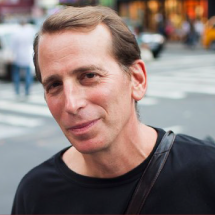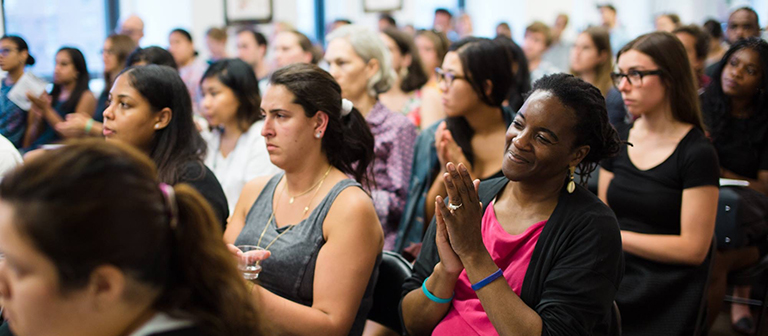I founded the Urban Justice Center (Center) back in 1984, with the goal of providing legal aid and advocacy for homeless people in New York City, New York. In the 35 years since, the Center has grown into a dynamic advocacy organization composed of distinct projects, all of which serve New York City’s most vulnerable residents -- street vendors, veterans, sex workers, domestic violence survivors, and asylum seekers.
Just this year, though, we made a bold move to scale up our impact. We announced five cutting-edge, early-stage nonprofit directors simultaneously -- the inaugural fellows of what we call the Social Justice Accelerator.
It’s an initiative that resembles a lot of the winning business practices we’ve seen come out of venture capital and the tech industry in Silicon Valley. The accelerator picks out extraordinary young organizations and provides their leaders with mentorship, workspace, legal and financial advice, donor connections, and a platform to enact sweeping change. We further brought on mentors to coach our “organizational fellows” with significant experience in their arenas.
Instead of e-commerce and digital media, the Social Justice Accelerator hopes to fuel the future of America’s social sector. The new fellows will change the world for LGBTQ asylum seekers, college athletes, at-risk youth in the Bronx, immigrant girls fleeing gender violence, and overly surveilled communities of color. These organizations are powered by the dynamism and imagination of young people, all sharing an ambition no less lofty than the transformation of American society.
This incubator model for social entrepreneurship is new to the U.S. philanthropic and nonprofit communities, although the practice has been in the private sector for some time. But, as I’ve learned from my time fighting for the public interest, it’s often precisely the institutions devoted to radical change that are most reluctant to change themselves.
So, I wanted to take this opportunity to explain some of the lessons I’ve picked up in my career and articulate how the nonprofit and philanthropic community can take advantage of the practices in emerging industries. Because even amid the widespread chaos, injustice, and existential doubt facing our world today, the moment has never been riper to innovate our approach to helping others.
Lesson I: Find the Right People and Let Them Do What They Want
If you talk to early-stage investors in tech companies, they will mostly tell you the same thing. Available market gaps are important. Game-changing ideas are important. But the most important thing by a long shot is the founder.
Do you trust them? Do they surround themselves with other effective people? Do they have what it takes to shift the paradigm? If the answer to these questions is no, then don’t bother, no matter the fundamentals of the organization behind them. But if they have the passion, judgment, egoless ambition, and intimacy of issue knowledge necessary to push things to the next level, then give them what they need and get out of their way.
I first met Becca Heller about a decade ago. A student at Yale Law, Becca had assembled a small team of advocates, former journalists, and military veterans, as part of a tiny refugee rights group operating as an extracurricular activity on campus. In the fallout from the Iraq War, she saw that attorneys had a moral and historical obligation to serve, pro bono, those fleeing violence and oppression in, and around, the Middle East.
When Becca came to the Urban Justice Center in 2010, her impeccable ethic, vast area expertise, and unimpeachable devotion to justice were hard to mistake. She went on to hire in-house staff in New York, establish offices in Jordan and Lebanon, expand to 29 law schools across the country, and partner with dozens of international firms. The center’s staff was there to coach her through some crises, but mostly, we just watched her work her magic, saving family after family from tragedy.
This was the origin story of what would become the International Refugee Assistance Project. And in 2018, the MacArthur Foundation recognized Becca for this accomplishment, awarding her a “genius grant.”
The Social Justice Accelerator is in some ways a monument to her success. As an institution in the social change space, we know our function is best served when we pass the baton down to dynamic individuals like Becca and let them change the world. If you believe in your founders, put them first. If that feels risky, I can assure you it’s a risk that will pay off.
Lesson II: Prepare to Pivot
Becca is just one of the extraordinary people who’ve graced the Urban Justice Center’s offices. Their personal successes come down to a key aptitude that also distinguishes the most effective social change nonprofits. And that aptitude, put simply, is the ability and the willingness to change course.
I met U.S. Senator, and 2020 U.S. Presidential Candidate, Cory Booker, when he was still in law school. He came down to interview at one of our projects, where some of my associates told him that we didn't have any room. When I heard about this -- after a quick glance at his resume, and some bonding over a shared love for broccoli and beans, I immediately got annoyed --we didn't have room for him? We’ll make room for him!
So, we pivoted. I picked up the phone, called Cory and told him the project he interviewed with did not have a space, but that we would see if there's something else for him to do. I asked him what he was interested in and he said he really wanted to work with kids in Newark, New Jersey. I thought it was a great idea. The Newark Youth Project was born.
But that’s when, like any good entrepreneur, Cory pivoted again, this time towards organizing tenants -- a glaring gap in Newark and a chance to do important work. And then he pivoted once more: those same tenants implored him to run for city council, where he ultimately won an upset victory.
I can’t thank Cory enough for teaching me this vital lesson: that success comes with a preparedness to game-change and course-correct, a readiness to seize opportunities as they arise.
The most powerful organizations are driven by a sense of responsibility based in ownership -- having their own board of directors, financial decisions, and general corporate architecture. It’s why we like to help our seed projects “pivot” into independent operations, and why the Social Justice Accelerator is designed to give our five fellows the wings to fly on their own.
Lesson III: Learn from the Communities You’re Affecting, and Be Ready to Do for Them What Nobody Else is Doing
Whether your organization is seeking to make a profit or fighting injustice, the same basic rule applies: the customer or client, whether or not they themselves know it, is your north star. Know who these people are and listen to them.
One of the victories I’m most proud of in my career revolved around a legal fight against the Grand Central Partnership and the 34th Street Partnership. Both organizations were part of a coalition of New York City builders, developers, property owners, and other interested stakeholders. To this day, they direct a lot of municipal decisions about when, where, and how to push forward economic activities in the heart of the city.
About 20 years ago, the Urban Justice Center took them both to court for projects they were spearheading in Midtown. Most people knew that the two partnerships were employing homeless people as security personnel, which seemed like a win-win. But what they didn’t know was that the homeless New Yorkers they employed were receiving illegal wages of $1 an hour. We ourselves were only able to find out about it by going to soup kitchens and having lunch with and talking to the people there. With Judge Sonia Sotomayor presiding over the case, we sued and won.
The Urban Justice Center seeks out “investigators” -- as project leads, and as fellows in our Social Justice Accelerator class -- the people who will listen to those in underserved communities and identify the issues that are overlooked.
There are countless overlooked issues and underserved communities for those willing to take the time to identify them. For example, the Center’s Sex Workers Project, which provides free legal assistance and therapeutic services to people engaged in the sex trade, is the only U.S. legal advocacy group meeting the needs of both sex workers and trafficking victims. Its’ efforts have been instrumental for a community whose struggles have only magnified as public conversation has shied away from recognizing those struggles. It has also elevated the issue of sex trade decriminalization into the mainstream of New York politics. In the race for Queens district attorney, it’s even become something of a litmus test. This kind of change during my lifetime was previously unimaginable.
It’s also the kind of change that requires some discomfort, and a lot of vision. When nobody else is leading on a major problem, find the people who will and give them the platform they need to disrupt the status quo.
With the Social Justice Accelerator, we’ve taken these lessons to heart. We know what we can achieve with nothing more than a dynamic advocate, an underserved social challenge, and a ritual questioning of our experiences, our sector, and ourselves. And we’re cautiously optimistic that our framework will eventually displace the current norm -- bending the arc just a bit further in the direction of justice.
Author bio

Doug Lasdon founded the Urban Justice Center (Center) in 1984 as a one-person operation in a burned-out building in East Harlem, New York to provide badly needed legal services to one of New York City's most underserved populations -- single, homeless adults. To make his services accessible to clients, he conducted outreach legal clinics directly in soup kitchens, making the Center the first organization in the country to use this approach. Since then, Doug has greatly expanded the agency's size, scope, and influence, while still holding fast to its core mission -- helping those at the farthest margins of society, both one at a time and collectively. Doug is now spearheading the agency’s new Social Justice Accelerator. Prior to founding the Urban Justice Center, Doug was a fellow and staff attorney at Covenant House in New York City.
Currently, Doug is an Adjunct Professor at Cornell Law School where he teaches Poverty Law and Social Entrepreneurship. Since 1987, he also has served as adjunct faculty at New York University, where he teaches Law and Urban Problems. In 2019, Doug taught in the J-Term at the William S. Richardson School of Law at the University of Hawaii. In the Spring of 2020, he will begin a new role at New York University Law School.
Over the years, Doug has served on numerous boards and advisory councils. Currently, he serves on the Board of Justice Project Pakistan. He previously has served as a consultant to the World Bank and as a Wasserstein Fellow at Harvard Law School. In the Fall of 2017, Doug was named Distinguished Practitioner in Residence at Cornell Law, where he received his law degree. He holds an undergraduate degree from the Wharton School at the University of Pennsylvania.



